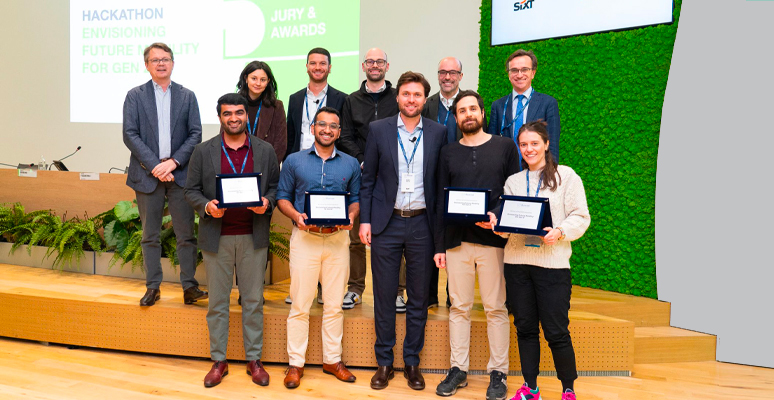
- Start Date
- Duration
- Format
- Language
- 26 Nov 2025
- 3 days
- Class
- Italian
Gestire in modo integrato progetti di trasformazione dell’organizzazione e della gestione della funzione vendite per perseguire l'eccellenza in ambito commerciale.
Milano, 9 September 2019
Speed and integration – two key words for the two functions and management areas that are under increasing pressure by rapidly evolving markets: Marketing and Sales. Two organizational pillars you need to take into account when investigating how, in the past twenty years, the art of understanding existing and prospect customers has evolved, along with the ability of communicating with them and reaching out to them with your offer. “Marketing & Sales” have become the two hands of one brain: talent and strategic acumen should be more and more integrated by technical expertise, much needed in the era of digitalization and big data.
Professor Marco Aurelio Sisti, Director of EMMS, SDA Bocconi’s international Executive Master in Marketing & Sales, will guide us in a brief exploration of these “new” organizational dimensions. He starts by looking at the future.
What are the macrotrends in marketing and sales?
The most evident is that multi-channel purchasing processes are becoming faster and more complex, both in the Consumer and Business markets. This is certainly due to the development of digital channels for communication and sales, with an inevitable fallout on offline channels as well. Data tell us that the challenge for the next years will be about leveraging this phenomenon rather than suffering it. Several companies are showing a proactive, anticipating attitude whilst many others, perhaps the majority of them, are dominated by a reactive approach: they are still playing defensively, trying to keep pace.
Are all stages of the marketing and sales processes speeding up?
Yes, and it is not only customer purchasing processes that have become quicker for companies but also the upstream stages, market research and targeting in the first place; here access to data and information as well as their interpretation and sharing within the company are becoming more and more crucial for Marketing and Sales planning. Traditional tools are no longer enough, companies need skilled specialists to manage the huge amount of information customers can access too. Marketers need to review market segments more subtly and more often, and to plan a more timely and effective communication to support customized offers. Without forgetting, that everything needs to be done in real time and dealing with a customer base more and more comfortable in switching from one channel to the other.
From data analysis to market strategy and the approach to customers: a seamless process, one should say.
No doubt, the process is becoming increasingly fluent. Today an integrated approach to Marketing & Sales is more successful than ever, for it allows you to plan your response to evolving markets and trade processes. It does not need to be organizational integration; it is enough to integrate processes, communication and, above all, managers’ mindset. Today customers, thanks to online channels, can “go upstream”, they have many more touch points with companies and brands. Research confirms: in some markets customers do not speak to sales staff until they have completed - on average - 60% of the purchasing process. This shifts huge responsibility on marketers, who need to be able to capture customers right from the start.
This means customers are better informed.
Yes, even though more information is not always better information. The problem for customers is often to correctly find their way through a huge amount of information, and not always a good-quality one. This can be an opportunity for marketing and sales networks, if well prepared when you help your customers find their bearings in the jungle, you set yourself apart from competitors and you also stand out from the background noise. Moreover, you will certainly manage to better communicate and sell your value. Today’s consumers have evolved into smarter counterparts and this means your point needs to be stronger.
What are the risks about that?
Risks are a higher negotiation rate in markets and a lower bargaining power for suppliers in some contexts. You can respond by boosting the consultancy side of marketing communication and of the salesforce, further down the process. Marketing needs to contribute to preparing channels for customer interaction in greater advance.
Will social media continue to prevail, or should we expect a “bubble effect”?
You need to distinguish the Consumer (individuals and households) context from the Business (companies) context. Within the first one, the role of socials in influencing behaviours and needs is far more important, and now no indicators show this general trend is heading for a turnaround. Companies should for their part pay attention to differentiating between socials according to the kind of communication they want to have, whom they target and what they say. They should also mind the life cycle of the various platforms: some are growing, others declining, and all this is happening at increasing speed. On the other hand, thinking that socials are everything is a mistake: many successful companies continue to invest in other channels, digital or not. No doubt, nowadays marketers need a solid analogic and digital skill mix.
Has the differentiation of age segments changed as well?
Age segmentation has always been taken into account but today you can enhance customer segmentation when it comes to communicating. For instance, today’s technologies allow you to create 20-30 different finales for a video clip according to the audience it targets. It is like saying: “I am just talking to you”. You can also offer contents that are more and more experiential and educational. In addition, if you use them the right way and integrate them with other Marketing & Sales tools, they can accelerate the development and management of interactions and customers.
Sticking to the digitalization of processes, can we say that marketing is becoming “hard science” and the human factor is losing importance?
Artificial intelligence is offering ever-increasing opportunities in many areas of management. Some companies have started using it in budgeting and HR management processes. AI is going to have important applications in marketing, for example in segmentation, which is the base of targeting strategies. As to sales, in some contexts it will become increasingly possible to sort out which existing or prospect customer the salesforce should turn to, and which kind of offer they should propose. But all of this is, and remains, no more than a set of tools. You should not stop using your brains and flair, and above all, you should preserve management from losing their motivation, which is one of the key factors of corporate success. Let alone creativity! I fear not to be mundane: many victories in marketing depend on brilliant insights, which can hardly come down to any algorithm. Especially in B2B, where the consultancy component is stronger, you cannot do without the human element.
What skills will then a Marketing & Sales professional need in the next future?
To boost Marketing and Sales, companies will certainly need managers with a good understanding of all company functions, to help them communicate via analogic and digital infrastructures. (Digital strategists should be among those managers). Marketing and Sales professionals will have to be more well informed in using profiling, communication and sales technologies, supported by a more and more social CRM. Never forget, though, that technical skills become obsolete much faster than managerial ones. You should then distinguish skill from skill and even think of them hierarchically: technical skills are important but they can be tapped from other sources within the organization or brought in from outside. In addition, this is impossible to do with core managerial abilities, instead.
Today more than ever, Marketing & Sales are a mix of science and art, and this makes them fascinating. It is certainly important to integrate a 360° communication, on- and offline; with colleagues inside the organization and with customers outside it. This is a condition for integrating not only the two functions in point but the rest of the organization as well. Moreover, markets are becoming increasingly global and you need to identify and leverage cultural differences: this is crucial in developing the new generations of Marketing & Sales managers. It is not by chance that innovation, integration and diversity are the pillars of EMMS, the Executive Master in Marketing and Sales by SDA Bocconi School of Management and ESADE Business School. The two top and long-time partner Schools will provide the 13th edition of this international part-time program in Milan, Barcelona and Madrid, challenging you with a truly unique professional, personal and cross-cultural experience.
SDA Bocconi School of Management

Gestire in modo integrato progetti di trasformazione dell’organizzazione e della gestione della funzione vendite per perseguire l'eccellenza in ambito commerciale.

Gestire il prodotto in ogni fase del suo ciclo di vita, bilanciare le esigenze dei clienti e garantire la redditività aziendale.

The program explains the potential and strategic role of social media marketing, redesigning the customer’s digital experience.


